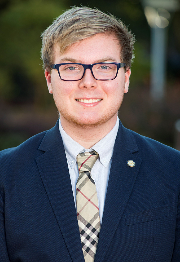
Tyler Meder, a bioengineering graduate student at the University of Pittsburgh, was awarded first place among more than 40 participants at a poster session during the 7th annual Symposium on Regenerative Rehabilitation. The title of his winning paper is “Combining a Peripheral Nerve Matrix Derived Hydrogel and Post-Surgical Therapy for Improving Functional Recovery Following Nerve Reconstruction.” The symposium was hosted in Seattle on October 11-13, 2018.
Mr. Meder works on peripheral nerve repair research in Pitt’s Swanson School of Engineering under the supervision of McGowan Institute for Regenerative Medicine faculty member Bryan Brown, PhD, assistant professor of bioengineering. The peripheral nervous system connects the brain and spinal cord to the rest of the body, and damage to these nerves could disrupt the brain’s ability to communicate with muscles and organs, resulting in a loss of sensation or motor functions.
According to Mr. Meder, “In the US, research shows that peripheral nerve injury (PNI) affects an estimated 20 million people,1 totaling nearly $150 billion yearly in health-care costs.2
“Surgical intervention becomes necessary in cases of PNI where the nerve is severed because of a slow or lacking regenerative response,” said Mr. Meder. “Therefore, creating a therapy to both increase the rate of regeneration as well as the extent of function regained is of great clinical interest.”
The research team is working with a novel peripheral nerve-specific extracellular matrix (PNM) hydrogel that has been shown to increase regeneration of injured peripheral nerves. They will combine this technology with post-surgical therapy to observe how they may work together to synergistically improve recovery after nerve reconstruction.
“Initial data from our study show that the nerve gel increases the rate of recovery and functional outcomes in a crush injury model,” said Mr. Meder. “We hope to further increase nerve recovery by applying an electrical stimulation therapy, which has been used clinically to increase nerve regeneration.”
The Symposium on Regenerative Rehabilitation is a part of the educational efforts of the Alliance for Regenerative Rehabilitation Research and Training (AR3T) – a multi-institutional network of laboratories at the University of Pittsburgh, Stanford University, Mayo Clinic, and the University of Texas at Austin. AR3T is an NIH-funded resource center that helps to develop research collaborations, provides educational opportunities, and funds pilot projects and technology development projects that will benefit the research community.
Congratulations, Mr. Meder!
1 Antfolk C, D’Alonzo M, Rosén B, Lundborg G, Sebelius F and Cipriani C. 2013 Sensory feedback in upper limb prosthetics. Expert Rev. Med. Devices, 10 45–54.
2 Taylor CA, Braza D, Rice JB, Dillingham T. The incidence of peripheral nerve injury in extremity trauma. Am J Phys Med Rehabil, 2008;87(5):381-5.
Read more…
University of Pittsburgh Swanson School of Engineering News Release
